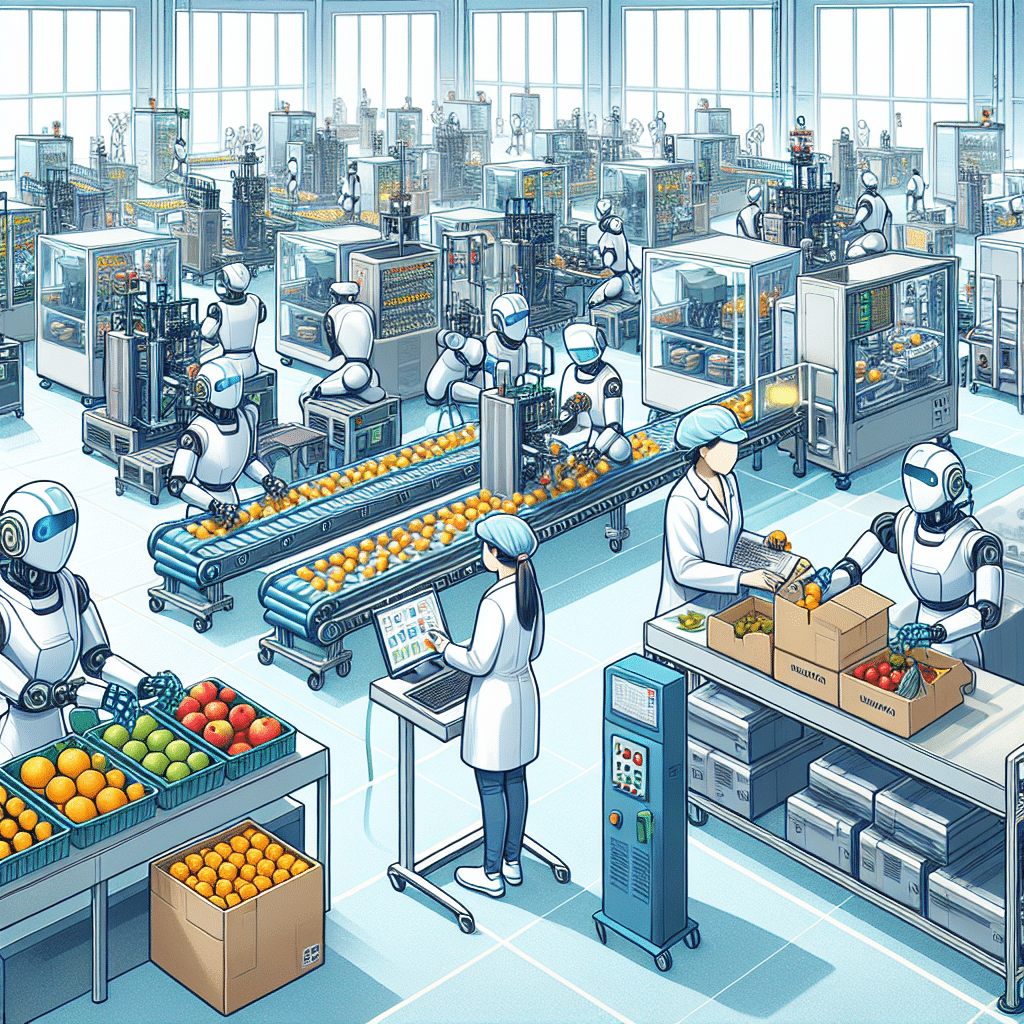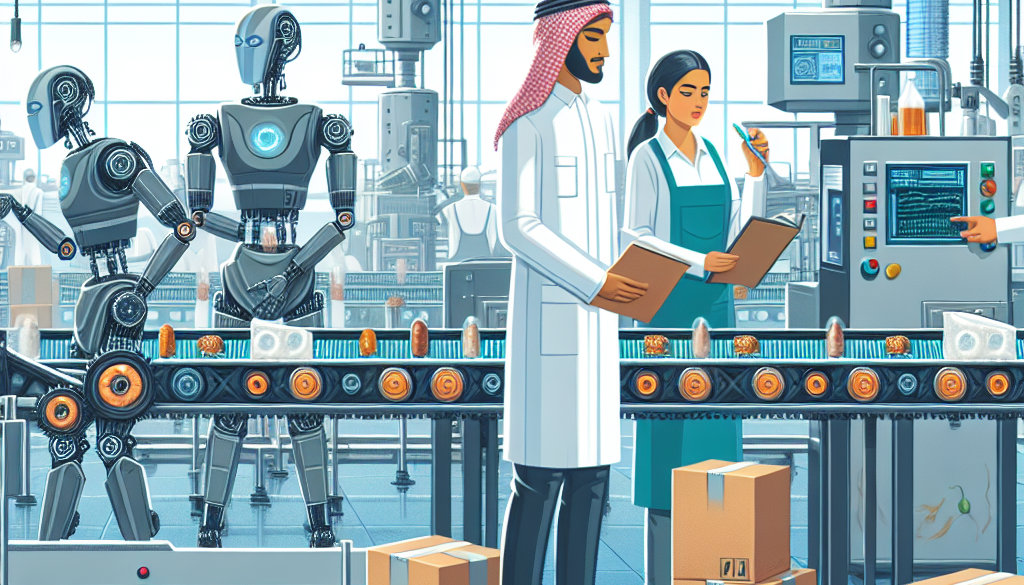Transformation of the Food Manufacturing Sector by Automation and Robotics
-
Table of Contents
- Automation and Robotics Revolutionize Food Manufacturing
- The Rise of Automation in Food Manufacturing
- Robotics: The Next Frontier in Food Manufacturing
- Challenges and Opportunities
- Case Studies: Success Stories in Automation and Robotics
- Looking to the Future
- Conclusion: Embracing the Technological Shift
- ETprotein: Your Partner in Quality Protein Products
Automation and Robotics Revolutionize Food Manufacturing

The food manufacturing sector is undergoing a significant transformation, driven by the relentless march of technology. Automation and robotics are at the forefront of this revolution, reshaping the landscape of food production, packaging, and distribution. This article delves into the ways in which these technological advancements are changing the industry, enhancing efficiency, and setting new standards for food safety and quality.
The Rise of Automation in Food Manufacturing
Automation has been a game-changer in the food manufacturing industry. It has enabled companies to increase production rates, reduce labor costs, and minimize human error. Here are some key areas where automation has made a substantial impact:
- Processing and Packaging: Automated systems are now capable of handling repetitive tasks such as sorting, cutting, and packaging with precision and speed that far surpass human capabilities.
- Quality Control: Advanced sensors and imaging technologies are used to detect defects or contamination, ensuring that only products that meet strict quality standards reach consumers.
- Supply Chain Optimization: Automation extends beyond the factory floor, streamlining inventory management, and logistics to create a more efficient supply chain.
Statistics show that the adoption of automation in food manufacturing is on the rise. According to a report by the Association for Packaging and Processing Technologies (PMMI), 94% of food manufacturers are using or considering automation technology to improve their operations.
Robotics: The Next Frontier in Food Manufacturing
Robotics is taking automation to the next level, introducing even greater flexibility and efficiency to food manufacturing processes. Here’s how robotics is making its mark:
- Precision Tasks: Robots are increasingly used for tasks that require high precision, such as decorating cakes or assembling intricate food products.
- Harsh Environments: Robots can operate in extreme temperatures or conditions that would be unsafe or uncomfortable for human workers.
- Collaborative Robots: Also known as cobots, these robots work alongside humans, combining the strengths of human dexterity with robotic consistency.
As per the Robotics Industries Association (RIA), the food and beverage sector saw a 56% increase in robot orders in recent years, highlighting the growing reliance on robotics in the industry.
Challenges and Opportunities
While the benefits of automation and robotics are clear, there are challenges to be addressed:
- Initial Investment: The cost of implementing these technologies can be high, though the long-term savings often justify the investment.
- Workforce Transition: There is a need for retraining and upskilling workers to operate and maintain these advanced systems.
- Regulatory Compliance: Manufacturers must ensure that automated and robotic systems comply with food safety regulations.
Despite these challenges, the opportunities presented by automation and robotics are vast. They offer the potential for enhanced food safety, reduced waste, and the ability to meet the growing global demand for food.
Case Studies: Success Stories in Automation and Robotics
Many food manufacturing companies have successfully integrated automation and robotics into their operations. For instance, a leading dairy company implemented robotic milking systems, resulting in a 20% increase in milk production. Similarly, a bakery used automated mixing and portioning systems to double its output without compromising on quality.
Looking to the Future
The future of food manufacturing is one where automation and robotics play a central role. With advancements in artificial intelligence and machine learning, these systems will become even more intelligent and adaptable. This will enable manufacturers to respond quickly to market changes and consumer preferences, ensuring a resilient and dynamic food supply chain.
Conclusion: Embracing the Technological Shift
The transformation of the food manufacturing sector by automation and robotics is not just a trend; it’s a fundamental shift in how we produce food. By embracing these technologies, manufacturers can achieve greater efficiency, improve food safety, and stay competitive in a rapidly evolving industry. The key takeaways from this transformation are clear: increased productivity, enhanced quality control, and a more robust supply chain.
ETprotein: Your Partner in Quality Protein Products
In line with the advancements in food manufacturing, ETprotein is at the forefront of providing high-quality protein products that cater to the needs of modern consumers. Their range of organic bulk vegan proteins and L-(+)-Ergothioneine (EGT) products are produced with the highest standards, ensuring that they meet the demands of a market that values health, sustainability, and innovation.
Whether you’re a manufacturer looking to incorporate plant-based proteins into your products or a distributor seeking reliable protein sources, ETprotein offers solutions that align with the technological advancements in food manufacturing. Their commitment to quality, non-GMO, and allergen-free products makes them an ideal partner in an industry that is rapidly embracing automation and robotics.
About ETprotein:
ETprotein, a reputable protein and L-(+)-Ergothioneine (EGT) Chinese factory manufacturer and supplier, is renowned for producing, stocking, exporting, and delivering the highest quality organic bulk vegan proteins and L-(+)-Ergothioneine. They include Organic rice protein, clear rice protein, pea protein, clear pea protein, watermelon seed protein, pumpkin seed protein, sunflower seed protein, mung bean protein, peanut protein, and L-(+)-Ergothioneine EGT Pharmaceutical grade, L-(+)-Ergothioneine EGT food grade, L-(+)-Ergothioneine EGT cosmetic grade, L-(+)-Ergothioneine EGT reference grade and L-(+)-Ergothioneine EGT standard. Their offerings, characterized by a neutral taste, non-GMO, allergen-free attributes, with L-(+)-Ergothioneine purity over 98%, 99%, cater to a diverse range of industries. They serve nutraceutical, pharmaceutical, cosmeceutical, veterinary, as well as food and beverage finished product distributors, traders, and manufacturers across Europe, USA, Canada, Australia, Thailand, Japan, Korea, Brazil, and Chile, among others.
ETprotein specialization includes exporting and delivering tailor-made protein powder and finished nutritional supplements. Their extensive product range covers sectors like Food and Beverage, Sports Nutrition, Weight Management, Dietary Supplements, Health and Wellness Products, and Infant Formula, ensuring comprehensive solutions to meet all your protein needs.
As a trusted company by leading global food and beverage brands and Fortune 500 companies, ETprotein reinforces China’s reputation in the global arena. For more information or to sample their products, please contact them and email sales(at)ETprotein.com today.












